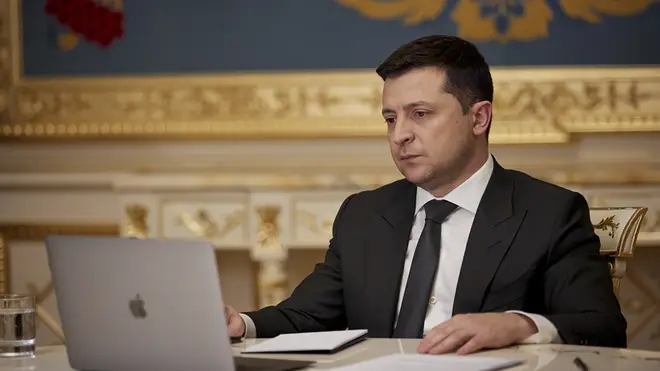
Nick Abbot 10pm - 1am
25 January 2022, 16:44

Russia has denied it is planning an assault, but it has massed an estimated 100,000 troops near Ukraine in recent weeks.
Ukraine’s leaders have sought to reassure the nation that an invasion by neighbouring Russia is not imminent, even as they acknowledged the threat is real and received a shipment of US military equipment to shore up their defences.
Moscow denies planning an assault, but it has massed an estimated 100,000 troops near Ukraine in recent weeks and is holding military drills at multiple locations in Russia. That has led the United States and its Nato allies to prepare for a possible war.
Several rounds of high stakes diplomacy have failed to yield any breakthroughs, and tensions escalated further this week.

Nato said it was bolstering its deterrence in the Baltic Sea region, and the US ordered 8,500 troops on higher alert for potential deployment to Europe as part of an alliance “response force” if necessary.
UK Prime Minister Boris Johnson also said he is prepared to send troops to protect Nato allies in Europe.
The US and its allies have vowed to hit Russia with unprecedented sanctions if Moscow sends its military into Ukraine, but have provided few details, saying it is best to keep President Vladimir Putin guessing.
The US State Department has ordered the families of all American personnel at the US Embassy in Kyiv to leave the country, and it said non-essential embassy staff could leave.
The UK is also withdrawing some diplomats and dependents from its embassy, and families of Canadian diplomatic staff have been told to leave.
In Ukraine, authorities have sought to project calm in order not to destabilise the situation and avoid panic — and many citizens have expressed scepticism that there will be an invasion soon.
In parliament, defence minister Oleksii Reznikov said that “as of today, there are no grounds to believe” that Russia is preparing to invade imminently, noting that its troops have not formed what he called a battle group that could force its way through the border.
“Don’t worry, sleep well,” he said. “No need to have your bags packed.”
His remarks follow multiple reassurances from President Volodymyr Zelenskyy and other officials. On Monday, Mr Zelenskyy told the nation the situation was “under control”.
In an interview aired late on Monday, Mr Reznikov acknowledged “there are risky scenarios” that “are possible and probable in the future”.
Russia has said Western accusations it is planning an attack are a cover for Nato’s own planned provocations. Kremlin spokesman Dmitry Peskov on Tuesday again accused the US of “fomenting tensions” around Ukraine, a former Soviet state that has been locked in a conflict with Russia for almost eight years.
In 2014, following the removal of a Kremlin-friendly president in Kyiv, Moscow annexed Ukraine’s Crimean peninsula and threw its weight behind a separatist insurgency in the country’s industrial heartland in the east.
The fighting between Ukrainian forces and Russia-backed rebels has killed more than 14,000 people, and efforts to reach a peaceful settlement have stalled.
In the latest standoff, Russia wants guarantees from the West that Nato will never admit Ukraine as a member and that the alliance would curtail other actions, such as stationing troops in former Soviet bloc countries.
Some of these, like the membership pledge, are non-starters for Nato, creating a seemingly intractable stalemate that many fear can only end in war.
Moscow has accused Ukraine of massing troops near rebel-controlled regions in the east, aiming to retake them by force — accusations Kyiv has rejected.
Analysts say Ukraine’s leaders are caught between trying to calm the nation and ensuring it gets sufficient assistance from the West in case of an invasion.
“Ukrainian authorities are trying to prevent destabilisation and panic inside the country, hence the calming statements saying there is no threat of an imminent Russian invasion,” political analyst Volodymyr Fesenko said.
“The Kremlin’s plans include undermining the situation inside Ukraine, fomenting hysteria and fear among Ukrainians, and the authorities in Kyiv find it increasingly difficult to contain this snowball,” he added.
A Kyiv International Institute of Sociology poll found about 48% of Ukrainians believe an invasion in the coming months to be a real threat.